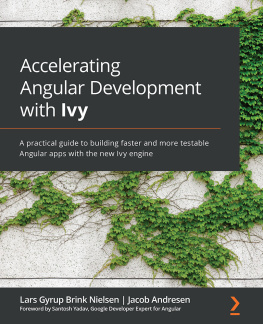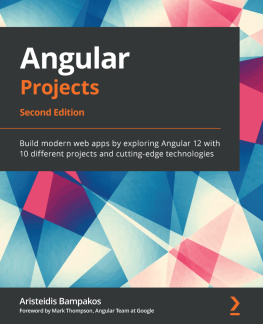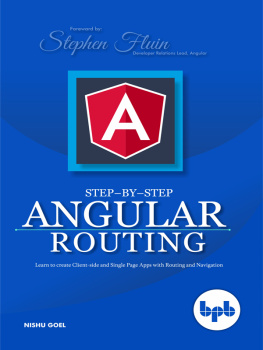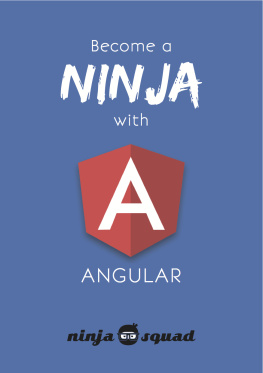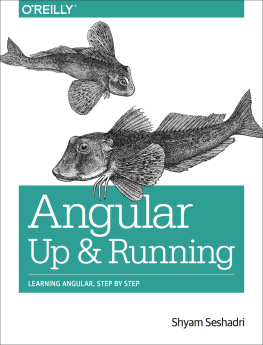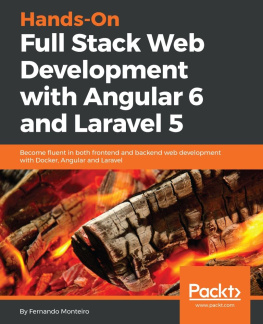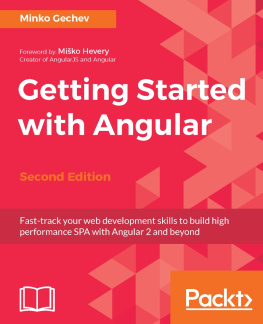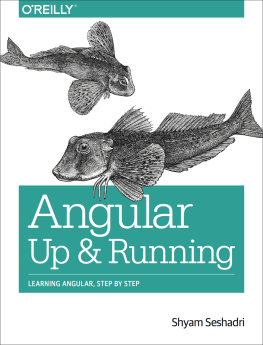Lars Gyrup Brink Nielsen - Accelerating Angular Development with Ivy: A practical guide to building faster and more testable Angular apps with the new Ivy engine
Here you can read online Lars Gyrup Brink Nielsen - Accelerating Angular Development with Ivy: A practical guide to building faster and more testable Angular apps with the new Ivy engine full text of the book (entire story) in english for free. Download pdf and epub, get meaning, cover and reviews about this ebook. year: 2021, publisher: Packt Publishing, genre: Home and family. Description of the work, (preface) as well as reviews are available. Best literature library LitArk.com created for fans of good reading and offers a wide selection of genres:
Romance novel
Science fiction
Adventure
Detective
Science
History
Home and family
Prose
Art
Politics
Computer
Non-fiction
Religion
Business
Children
Humor
Choose a favorite category and find really read worthwhile books. Enjoy immersion in the world of imagination, feel the emotions of the characters or learn something new for yourself, make an fascinating discovery.
- Book:Accelerating Angular Development with Ivy: A practical guide to building faster and more testable Angular apps with the new Ivy engine
- Author:
- Publisher:Packt Publishing
- Genre:
- Year:2021
- Rating:5 / 5
- Favourites:Add to favourites
- Your mark:
Accelerating Angular Development with Ivy: A practical guide to building faster and more testable Angular apps with the new Ivy engine: summary, description and annotation
We offer to read an annotation, description, summary or preface (depends on what the author of the book "Accelerating Angular Development with Ivy: A practical guide to building faster and more testable Angular apps with the new Ivy engine" wrote himself). If you haven't found the necessary information about the book — write in the comments, we will try to find it.
Get a comprehensive introduction to the major Angular framework rewrite known as Angular Ivy
Key Features- Upgrade your Angular applications from traditional View Engine to modern Angular Ivy
- Get a detailed walkthrough of the new features and breaking changes in Angular
- Explorer new Angular APIs, syntax, tooling, and configurations for modern frontend web development
Angular Ivy is the latest rendering engine and compiler introduced in Angular. Ivy helps frontend developers to make their Angular applications faster, better optimized, and more robust. This easy-to-follow guide will help you get to grips with the new features of Angular Ivy and show you how to migrate your Angular apps from View Engine to Ivy.
Youll begin by learning about the most popular features of Angular Ivy with the help of simple stand-alone examples and realize its capabilities by working on a real-world application project. Youll then discover strategies to improve your developer workflow through new debugging APIs, testing APIs, and configurations that support higher code quality and productive development features. Throughout the book, youll explore essential components of Angular, such as Angular Component Dev Kit (CDK), Ahead-of-time (AOT) compilation, and Angular command line interface (CLI). Finally, youll gain a clear understanding of these components along with Angular Ivy which will help you update your Angular applications with modern features.
By the end of this Angular Ivy book, you will learn about the core features of Angular Ivy, discover how to migrate your Angular View Engine application, and find out how to set up a high-quality Angular Ivy project.
What you will learn- Find out why Angular Ivy tests are faster and more robust
- Explore the concept of CSS custom properties and scoping of values and learn how to use them with Angular Ivy
- Use testing harnesses present in Angular components to write effective tests
- Explore the architecture of the Angular compatibility compiler and understand why it is important
- Discover effective techniques for migrating your existing Angular apps to the Ivy engine
- Overcome challenges that you might face when switching to AOT compilation
This book is for experienced Angular web developers who want to migrate to the latest Ivy engine for building faster web applications. Intermediate knowledge of Angular and TypeScript will help you get the most out of this book.
Table of Contents- Discovering New APIs and Language Syntax
- Boosting Developer Productivity Through Tooling, Configuration, and Convenience
- Introducing CSS Custom Properties and New Provider Scopes
- Exploring Angular Components Features
- Using CSS Custom Properties
- Using Angular Components
- Component Harnesses
- Additional Provider Scopes
- Debugging with the New Ivy Runtime APIs
- Using the Angular Compatibility Compiler
- Migrating your Angular Application from View Engine to Ivy
- Embracing Ahead-of-Time Compilation
Lars Gyrup Brink Nielsen: author's other books
Who wrote Accelerating Angular Development with Ivy: A practical guide to building faster and more testable Angular apps with the new Ivy engine? Find out the surname, the name of the author of the book and a list of all author's works by series.

